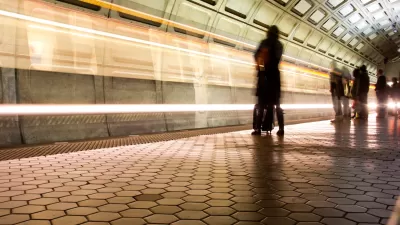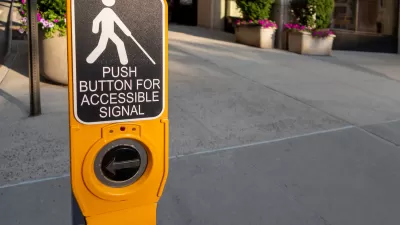A federal judge ruled that the city fails to provide “meaningful access” to many of its streets due to a lack of infrastructure for pedestrians with vision impairments at most of the city’s intersections.

A federal judge ruled that the City of Chicago has not provided sufficient accommodations for people with disabilities in violation of the Americans with Disabilities Act (ADA), reports Eli Ong for WGN 9. “The complaint, filed at the time by the federal government, alleged the City failed to provide people who are blind, have low vision or are deaf-blind with accessible pedestrian signals (APS’s) at intersections, e.g., the equivalent of ‘walk/don’t walk’ visual signals that indicate when it is safe to cross the street for pedestrians without visual disabilities.”
According to Ong, “fewer than 1% of intersections equipped to provide sighted pedestrians visual signals (nearly 2,800) were equipped with APS’s for people who are blind or have low vision.” This amounts to a lack of “meaningful access” to the city’s transportation network and, per a press release from Disability Rights Advocates, “may be the worst of any major metropolitan area in the United States.”
In the same press release, Jelena Kolic, Senior Staff Attorney at Disability Rights Advocates, says, “Chicago has long been famous for its walkability. Thanks to this decision, blind residents will be much better equipped to enjoy that walkability.” The decision also “sends a message to cities and towns across the state and around the country that they can no longer deny pedestrians who are blind full and equal access to signalized intersections,” says Ray Campbell, one of the plaintiffs in the case.
FULL STORY: Federal judge finds City of Chicago liable, violated Americans with Disabilities Act

Planetizen Federal Action Tracker
A weekly monitor of how Trump’s orders and actions are impacting planners and planning in America.

Restaurant Patios Were a Pandemic Win — Why Were They so Hard to Keep?
Social distancing requirements and changes in travel patterns prompted cities to pilot new uses for street and sidewalk space. Then it got complicated.

Map: Where Senate Republicans Want to Sell Your Public Lands
For public land advocates, the Senate Republicans’ proposal to sell millions of acres of public land in the West is “the biggest fight of their careers.”

Maui's Vacation Rental Debate Turns Ugly
Verbal attacks, misinformation campaigns and fistfights plague a high-stakes debate to convert thousands of vacation rentals into long-term housing.

San Francisco Suspends Traffic Calming Amidst Record Deaths
Citing “a challenging fiscal landscape,” the city will cease the program on the heels of 42 traffic deaths, including 24 pedestrians.

California Homeless Arrests, Citations Spike After Ruling
An investigation reveals that anti-homeless actions increased up to 500% after Grants Pass v. Johnson — even in cities claiming no policy change.
Urban Design for Planners 1: Software Tools
This six-course series explores essential urban design concepts using open source software and equips planners with the tools they need to participate fully in the urban design process.
Planning for Universal Design
Learn the tools for implementing Universal Design in planning regulations.
Heyer Gruel & Associates PA
JM Goldson LLC
Custer County Colorado
City of Camden Redevelopment Agency
City of Astoria
Transportation Research & Education Center (TREC) at Portland State University
Camden Redevelopment Agency
City of Claremont
Municipality of Princeton (NJ)





























